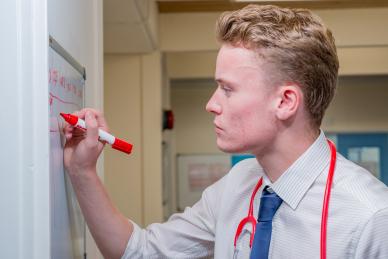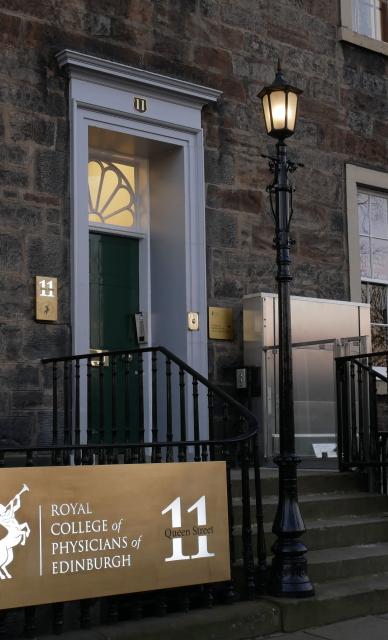Join the College
The College is here to support you at all stages throughout your career to enable you to deliver the highest standards of healthcare to patients.
Empowering medical excellence, shaping healthcare futures.
As the name suggests clinical neurophysiology is a clinical as well as a diagnostic specialty with a mixture of hands-on and interpretative skills used in the investigation and management of patients with neurological/neuromuscular disorders.
The focus is very much on training rather than service provision which sometimes can take up most of the time of a Specialty Registrar. Trainees are closely supervised and learn from senior colleagues at the beginning before gradually becoming independent. There are no time or service pressures placed on Registrars, particularly early on in the programme.
As there are no shifts or night shift, there is more time to spend doing audits/get involved in research projects or reading. Study leave is actively encouraged and there are few limitations, other than financial, for attending appropriate courses, including national/international courses
I chose this specialty as I had always had an interest in neurology/neuroscience and having spent several years in general medicine, was considering my career options. I knew I still wanted to work in hospital medicine and still see patients, and I had always really enjoyed the diagnostic side of medicine. After doing some research on the subject and hearing about the opportunities available, I arranged to spend time in a local department and then successfully applied for a post
Dr Shona Livingstone is an ST6...
"I had always had an interest in neurology/neuroscience and having spent several years in general medicine, was considering my career options. I knew I still wanted to work in hospital medicine and still see patients, and I had always really enjoyed the diagnostic side of medicine."

Variety of work
It’s a hospital-based specialty with close interactions across different specialties; neurology and neurosurgery as well as many other specialties including orthopaedics, rheumatology, general medicine and paediatrics
The patients are from all age groups and may have a wide range of symptoms/conditions
I still have lots of patient contact but also get to use technical as well as clinical skills to try and solve the diagnostic puzzle
The working hours are 9:00 am to 5:00 pm and this means it’s much easier to maintain a good work/life balance
It is also a good specialty for those considering less than full-time training
There is no night shift/hospital at night and not all departments do on-call. Where I am based, I am on-call for one weekend every five weeks and this is from home
This is a small specialty but unlike many others, job prospects are currently good with vacancies in training and Consultant posts available
Training opportunities and Consultant posts may not always be in the region you want to work, given the relatively small numbers working in the field, and some may consider this a disadvantage
Another aspect which may be considered a downside is the lack of patient continuity. In general we are only involved for a short period and are not always aware of how patients got on and the eventual outcome. However you can always make enquiries and revisit patients on the ward, which I often do
Each day is different and varies depending on where you do your training. About half of my time is spent seeing and assessing patients in the nerve conduction studies/electromyogram (EMG) clinic. This involves taking a history, examining and then using technical skills to carry out and interpret appropriate tests. These are usually outpatients but we regularly see acute inpatients and can be asked to assess patients in the Intensive Treatment Unit (ITU).
The rest of the time is usually spent reviewing and reporting investigations such as electroencephalography (EEGs) or evoked potentials. Mostly we report these without having met the patient, similar to the duties of a radiologist. However in the hospital I work in, we do have inpatients that may be having a prolonged EEG recording or undergoing assessment for epilepsy surgery and we will be closely involved in these cases with direct patient contact and assessment.
In some departments there may be time spent in theatre performing intra-operative monitoring . This can be used in patients having spinal or intracranial surgery for example.
There is also time allocated for attending teaching sessions and multi-disciplinary team (MDT) meetings as well as private study time.


This is a four-year programme. A minimum of two years is spent training in neurophysiology and learning the various techniques. Another year may be spent in neurophysiology with opportunities for research projects in this time or spent exclusively as a research year in the specialty. One year of neurology experience must be obtained during the training programme. This usually involves time on the ward as well as in specialist outpatient clinics. There are a couple of training programmes available in the UK which offer dual accreditation in neurophysiology and neurology.
MRCP(UK) or MRCPH is required at time of appointment to ST3. Trainees will be required to complete two exams in the four-year training period. This will not be a pass/fail exam but will be a knowledge-based formative assessment (KBA).
Throughout training we keep a logbook to ensure adequate exposure and experience in the various areas of the specialty. There are specialty training days three times a year which are organised nationally and often take place in England. We are encouraged to attend all of these if possible but attendance at two out of three is expected. It is a good opportunity to meet other trainees in what is a relatively small specialty.
During the four-year training programme there are usually research projects that trainees can be involved in and this is encouraged. For those who wish to obtain a higher qualification such as an MD/PhD, there are opportunities to spend time out of programme doing research (OOPR). This could be clinical or lab-based and there are lots of research projects around the UK which are available. This requires approval from the deanery and the Joint Royal Colleges of Physicians Training Board (JRCPTB).
Having an interest in neurosciences in general is necessary and you need to try and demonstrate this when applying. Any time spent as a medical student, perhaps a project or a student selected component (SSC) in neuroscience, is definitely worth mentioning
Spending time in a medical/surgical rotation which rotates through neurology/neurosurgery either in adults or paediatrics can also be an advantage
It is always a good idea to experience what the job involves first hand and I strongly recommend trying to arrange a ‘taster’ day in a neurophysiology department. This gives you an idea of what is involved but also demonstrates your interest
If it is not possible to get time for a taster day, make informal contact with a local department for more information

The College is here to support you at all stages throughout your career to enable you to deliver the highest standards of healthcare to patients.